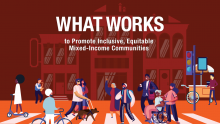How does NIMC define racial equity?
NIMC thinks about racial equity in terms of both an outcome and a process. Racial equity places priority on ensuring that people of color are afforded opportunities that they historically have been denied and from which they continue to be excluded.
- As a process, it means that Black, Brown and other people of color are actively leading the creation and implementation of policies, programs and practices that have an impact in their lives. It also means that White people are acknowledging and confronting racism and unconscious bias within themselves in addition to the sometimes flawed existing regulations that shape the places where we all live, work, learn, and gather.
- As an outcome, it means that a person’s racial identity does not determine their life opportunities and results, such as access to a safe home and amenity-rich neighborhoods.
Our founder and director, Dr. Mark Joseph, writes a blog on Everyday Antiracism. You can find the first blog here. Also, he shared his thoughts on racial equity and racial justice at a City Club of Cleveland event titled 'An Antiracist Love Letter to Cleveland'. You can find the transcript and video here.
- Launched the Bending the Arc podcast about promoting inclusive and equitable communities in September 2020, which to date has featured over 15 episodes
How does NIMC as an organization live out its commitment to racial equity?
Our mission is “to promote urban equity and inclusion through impact research that achieves more effective and durable social change outcomes.” We are on a journey to advance community and systems change strategies that build inclusion, equity, and justice. We seek to remain vigilant in this work as individuals and as an organization. Here are some examples of our efforts:
Organizational Change Efforts within the National Initiative of Mixed-Income Communities:
- Changed our approach to capitalizing Black and White in the almost 40 essays we edited and produced in the What Works to Promote Inclusive, Equitable Mixed-Income Communities after meaningful discussions with our team, influenced by the leadership of Race Forward.
- Discussed how White supremacy shows up at NIMC, our workplace, using the article White Supremacy Culture by Tema Okun as a guide.
- Discussed how Breonna Taylor’s killing took place in the context of a mixed-income neighborhood transformation and the racist law enforcement practices surrounding urban redevelopment.
- White staff read, reflected, and discussed the insights in the book Me and White Supremacy by Layla Saad. This work led to changes in our operating culture and continued efforts to dismantle White Supremacy within ourselves.
- Elevated our consideration of the plight, oppression, racism and outlook faced by Indigenous peoples by reading work by Indigenous authors and adopting our Canadian colleagues’ Land Acknowledgement practices.
- Assessed NIMC’s current portfolio and created criteria and practices for assessing future work based on the impact of advancing racial equity and racial justice.
Developed the Following Tools to Support Community and Systems Change Efforts with Others:
- Produced Advancing Racial Equity in Housing and Community Development: An Anti-Racism Guide for Transformative Change in partnership with Grounded Solutions Network with the goal of building capacity among people working across different geographies, professional disciplines, and scales.
- Produced Advancing Racial Equity in Inclusionary Housing Programs: A Guide for Policy and Practice in partnership with Grounded Solutions Network with the goal of enhancing racial equity approaches within inclusionary housing efforts.
- Publicly released a working version of the HOPE SF Racial Equity and Reparations Guide along with our colleagues with the HOPE SF initiative in San Francisco in October 2020, and conducted close to 80 discussions with local stakeholders to activate their deployment of a racial equity and reparations approach. The following links are collections of information that was gathered in the research to create guide.
- Launched the Bending the Arc podcast about inclusion, racial equity and racial justice in September 2020, which to date has featured 5 guests with more planned this year.
The content in these tools is relevant to a wide range of audiences including policymakers, planners, program administrators, developers, owner-operators, property managers, advocates, community organizers, and residents who seek to infuse racial equity into policies and programs.
Even those with the best intentions struggle in the difficult journey to confront inherent bias and racism that has been built into the systems in which we live and work. We hope these tools, combined with your continued work, will advance an unwavering commitment to intentionally support communities of color with anti-racist approaches.
Ultimately, we hope these tools will spark courageous conversations and meaningful actions focused on racial equity.


